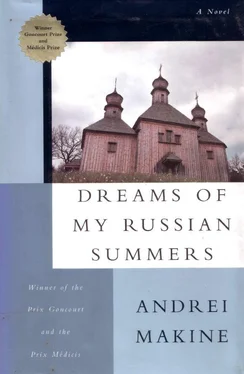The keen air above the boulevard condensed and began to fall as a fine, dogged rain. I got up. The reassuring voice had fallen silent. I felt as if my head were wrapped in a cloud of red-hot cotton wool. I dodged a passerby who was walking along holding a little girl by the hand. I was afraid I might alarm the child with my inflamed face, and the cold shivers shaking me… Wanting to cross the road, I stumbled against the edge of the pavement and waved my arms like a tightrope walker. A car braked and just avoided me. I felt a brief grazing of the door handle against my hand. The driver took the trouble to lower his window and hurl an oath at me. I saw his scowl, but his words reached me with a strange cotton-wool slowness. At the same moment a thought dazzled me with its simplicity: "That's what I need. That impact, that encounter with metal, but much more violent. An impact that would shatter my head, my throat, my chest. That impact, and then instant, final silence." Several whistle blasts pierced the fog of the fever that burned my face. Absurdly, I got the idea that a policeman might have set off in pursuit of me. I sped up my pace, floundering on a saturated patch of lawn. I could not breathe. My vision broke up into a multitude of sharp-edged facets. I had an urge to burrow in the ground like an animal.
I was drawn in by a misty void, which opened up into a broad avenue, beyond a wide-open gate. It seemed to be floating between two lines of trees, in the dull air of the twilight. Almost at once the avenue was filled with strident whistle blasts. I turned into a narrower path, skidded on a smooth stone slab, and plunged between strange gray cubes. Finally, without strength, I crouched behind one of them. The whistle blasts rang out for a moment, then fell silent. From a long way off I heard the grating sound of the gate's metal bars. On the porous wall of the cube I read these words, without immediately grasping the sense of them: Plot held in perpetuity. Number… Year 18 …
Somewhere behind the trees a whistle blast rang out, followed by a conversation. Two men, two keepers, were walking up the avenue.
I got up slowly. And through the weariness and the torpor of the start of my illness, I felt a flicker of a smile on my lips; "mockery must enter into the nature of the things of this world. By the same token as the law of gravity…"
All the gates of the cemetery were now closed. I walked round the family vault behind which I had collapsed. The glass door yielded easily. The interior seemed to me almost spacious. Apart from the dust and a few dead leaves, the paving was clean and dry. My legs would not support me any longer. I sat down, and then stretched out full length. In the darkness my head brushed against a wooden object. I touched it. It was a prie-dieu. I rested my neck on its faded velvet. Oddly, its surface seemed warm, as if someone had just been kneeling on it…
For the first two days I left my refuge only to go and look for bread and to wash. I returned at once, stretched out, and sank into a feverish numbness from which I was only roused for a few minutes by the whistle blasts at closing time. The great gate creaked in the fog, the world was reduced to these walls of soft porous stone, which I could touch if I spread out my arms in the form of a cross; to the reflection of the ground glass panes of the door; and to the resonant silence, which I believed I could hear beneath the paving stones, beneath my body…
I rapidly became confused about the sequence of dates and days. I remember only that one afternoon I finally felt a little better. Walking slowly, screwing up my eyes in the returning sunlight, I was going back… home. Home! Yes, that was my thought: I surprised myself thinking it, and started to laugh, choking in a fit of coughing that made the passersby turn. This family tomb more than a century old, in the least-visited part of the cemetery, where there were no famous tombs to honor – my "home." With amazement I told myself I had not used the word since my childhood…
It was during that afternoon, by the light of the autumn sun shining into my vault, that I read the inscriptions on the marble tablets fixed to its walls. It was, in fact, a little chapel belonging to the Belval and Castelot families. And the laconic epitaphs on the tablets retraced their history in outline.
I was still too weak. I read one or two inscriptions and then sat down on the paving stones, breathing as if after a great effort, my head buzzing with giddiness. Born September 27, 1837, at Bordeaux. Died June 4, 1888, in Paris. Perhaps it was the dates that made me giddy. I took note of their time as acutely as if I were hallucinating. Born the 6th March 1849. Recalled to God the 12th December 1901. The intervals between these dates became filled with sounds, with silhouettes, mixing history and literature. There was a flow of images, the vivid and very concrete sharpness of which was almost painful. I thought I could hear the rustling of a lady's long dress as she stepped into a cab. In this simple action of times past she embodied all those anonymous women who had lived, loved, and suffered; who had seen this sky, breathed this air… Now I felt physically the cramped stiffness of a dignitary in his black suit: the sun, the great square of a provincial town, the speeches, the brand new republican emblems… Now the wars, the revolutions, the swarming crowds, the great holidays, all fused for a second into one character, one explosion, one voice, one song, one salvo, one poem, one sensation – and the flow of time resumed its course between the date of birth and the date of death. She was born August 26, 1861, at Biarritz. Deceased February 11, 1922, at Vincennes.
I progressed slowly from one epitaph to the next: Captain of the Empress's Dragoons. Divisional General. Painter of History, attached to the French armies: Africa, Italy, Syria, Mexico. Intendant General. Section President of the Conseil d'Etat. Woman of letters. Former Public Auditor to the Senate. Lieutenant in the 224th Infantry Regiment. Croix de Guerre with palms. Died for France… They were the shades of an empire once resplendent at all four corners of the world… The most recent inscription was also the shortest: Françoise, November 2, 1952-May 10, 1969. Sixteen years old; any other words would have been excessive.
I sat down on the paving stones and closed my eyes. I sensed the vibrant density of all those lives in myself. And without trying to formulate my thoughts, I murmured, "I feel the climate of their days and of their deaths. And the mystery of that birth at Biarritz on August 26, 1861. The inconceivable individuality of that birth, precisely at Biarritz, that day, more than a century ago. And I feel the fragility of that face that disappeared on May 10, 1969, I feel it like an emotion that I myself have lived through intensely… These unknown lives are close to me."
I left in the middle of the night. The stone wall was not high at that point. But the hem of my coat caught on one of the iron spikes set in the top of the wall. I almost fell head first. In the darkness the blue eye of a street lamp described a question mark. I fell on a thick layer of dead leaves. My descent seemed to take a very long time; I had the impression of landing in an unknown town. Its houses at this night hour resembled the monuments of an abandoned city. Its air smelled of wet forest.
I began to walk down an empty avenue. All the streets I followed went downhill, as if to keep thrusting me farther toward the heart of this opaque megalopolis. The few cars that passed me looked as if they were fleeing from it at top speed, driving straight ahead. As I walked past him, a tramp stirred in his carapace of cardboard boxes. He put his head out; it was lit by the shop window across the street. He was an African, his eyes heavy with a kind of resigned, calm madness. He spoke. I leaned toward him, but I understood nothing. It was doubtless the language of his country… The cardboard boxes of his shelter were covered in hieroglyphs.
Читать дальше












